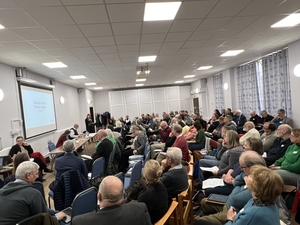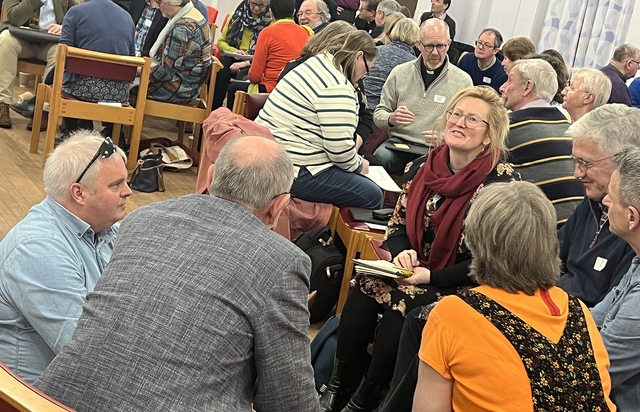
Diocesan Synod, March 2024
PRESIDENTIAL ADDRESS
Bishop Jonathan spoke about our progress towards our diocesan vision and strategy - as well as our response to poverty within our communities - as he gave his Presidential Address during a Eucharist in our cathedral. You can read it here.
QUESTIONS FROM MEMBERS
General Synod member Rebecca Hunt asked two questions under standing order 82 about the Department for Education's draft guidance on children who are questioning their gender, which were answered in writing by director of education Jeff Williams. You can read the questions and his responses here. Supplementary questions were asked about the date by which the government consultation will be complete, and why our diocese has not yet responded. The bishop said the consultation would end in April, and that our diocese was waiting for the government consultation to be completed before putting in a formal response.
SAFEGUARDING
Safeguarding manager Emily Hassan gave Synod members an update on the recent Wilkinson and Jay reports into C of E safeguarding. She agreed with Professor Jay's recommendation that oversight of C of E safeguarding could be given to an independent body, but she objected to the recommendation that operational safeguarding should be independent. Among other reasons, the report hadn't acknowledged the recent improvement in C of E safeguarding practices, plus there was the fact that the IICSA hadn't recommended this change despite being chaired by the same person, and the context that safeguarding being fully embedded into the Church's life meant that everyone had to share responsibility for it.
Emily suggested that Professor Jay's model, in which only high-risk cases would be passed on to a new independent body managing safeguarding operations, would mean that none of the current preventative work being done would be carried out. She also opposed the idea of dropping 'spiritual abuse' as a category, as there are cases where the Christian or theological context of the abuse made it different to emotional or psychological abuse.
GENERAL SYNOD UPDATE
General Synod member Lucy Docherty reported on the February session of General Synod, which included a number of significant decisions, including their discussion about safeguarding in the wake of the Wilkinson and Jay reports mentioned above. There was also :
- a motion from London diocese that we redirect funeral fees from dioceses to parishes;
- a code of conduct for PCCs;
- a debate about clergy pensions;
- action to tackle biodiversity crisis;
- a call for resources to be available for racial justice work;
- legislation to combat bullying by lay officers;
- a change to the canons regarding ordination after divorce; and
- the debate on Living in Love and Faith, which ultimately involved synod members voting to 'move to next business' because they could see there was nothing to be gained by voting on this. This has resulted in these next steps being taken.
You can read more about the work of General Synod on churchofengland.org/about/general-synod.
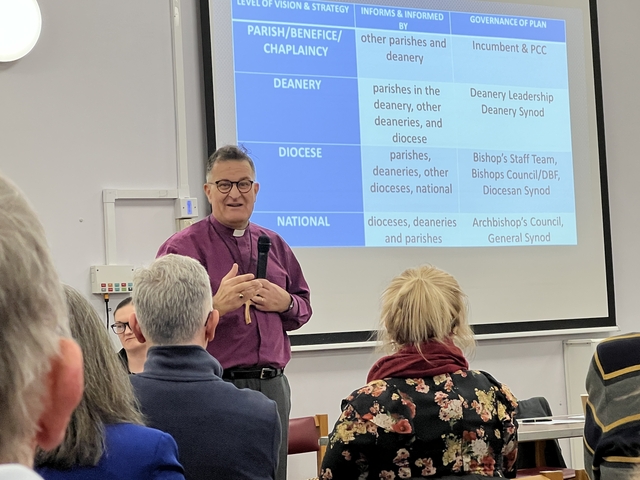
DIOCESAN VISION AND STRATEGY
Bishop Jonathan introduced a discussion about our diocese’s evolving vision and strategy by talking about how it was possible for a diocese to have a strategy. He talked about the different levels in the Church of England and its dispersed model of leadership, which means that leaders create vision and strategy at all sorts of levels – parish, deanery, diocese and national Church. Those visions inform and are informed by each other, and governance of them rests at different levels too. A diagram similar to this one helped Synod members to understand more:
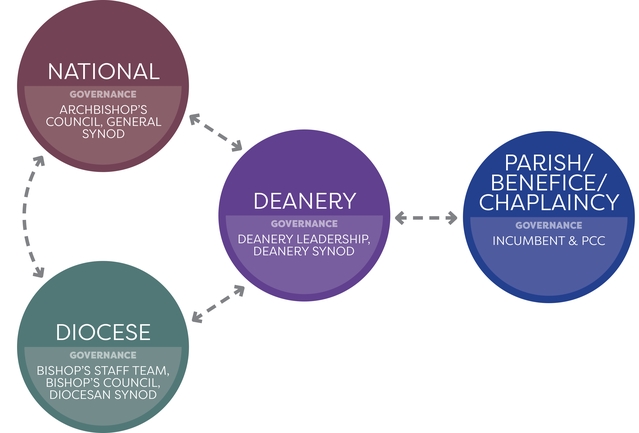
Bishop Jonathan said that a good diocesan strategy would take seriously the planning at deanery level, which in turn would take seriously what parishes were doing. Each of these would also take account of the strategy being pursued at national level.
He also explained that the tone of this process was invitational. Parishes and deaneries would be invited to take part in this process, all of which would be led by the Holy Spirit.
The Archdeacon of the Isle of Wight, the Ven Steve Daughtery, then described our evolving Vision and Strategic Framework, which aims to present the heartbeat of our diocesan life. It aims to share who we are (Jesus-Centred) and who we want to be (Kingdom-Seeking), so that by the grace of God we might make disciples who can bless our world, and thrive and grow together as his people.
He outlined some of the challenges we face: declining attendances, older congregations, expensive buildings, over-stretched staff, and a gap between the costs of our ministry and our income. So our strategic framework would aim to place children and young people at the heart of our planning, and also seek to revive, revitalise and renew our existing leadership and churches. That would involve:
- Rejuvenate: we want to create thriving churches where families can find a place of belonging and purpose. This may involve reducing the age profile of congregations, and an emphasis on our work with children and young people. This aspiration is a watermark that runs through the following parts of our strategy:
- Revive: we want to revive the spiritual leadership in our diocese, so lay and clergy leaders are vibrant disciples, whose faith is deep and attractive to others. This may involve some inspirational ministers coming alongside, coaching and equipping our leaders. It also could involve lay and clergy leaders forming clusters who can eat, laugh, learn, lament, pray and offer support together, to deepen their faith and develop more effective ministry;
- Revitalise: we want to develop a culture where churches create pathways by which people might become disciples in their local congregations. It may involve encouraging church members to engage with the world, evangelise in words and deeds, establish disciples centred in Jesus, and equip those new disciples for mission. It may also involve specific initiatives, including:
- Choir Church: using worship to intentionally create new disciples;
- School Chaplains: to care for the mental and spiritual wellbeing of children and young people;
- investment in areas of potential;
- investment in areas of disadvantage.
- Renew: in places where there is little effective gospel presence, we will seek to plant new congregations that are resourced to thrive. So we might plant brand new worshipping communities using investment from the national Church, and pilot new worshipping communities in schools, in partnership with the Church of England's Flourish initiative, among other things.
You can see Steve’s full presentation here.
Synod members heard from the Rev Fran Carabott, who had established a church plant at St Margaret’s Church in Southsea with few resources available at the outset. This initially small community had succeeded in transforming their building into a thriving hub for the local community and a place where disciples are created and nurtured. Read more about what has happened here and you can read Fran’s story here.
Synod members were able to discuss these ideas in smaller groups and provide feedback, which was noted and will inform future discussions.
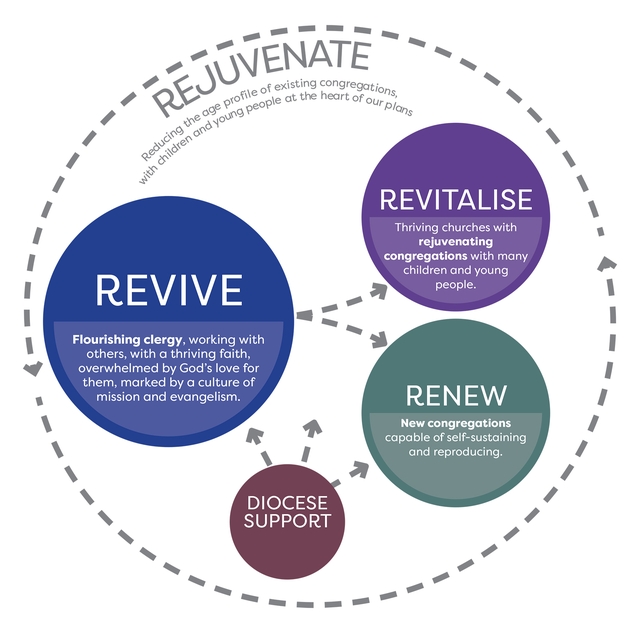
Vanda Leary, our diocese's strategic projects manager, then explained the next steps to turn this initial thinking into a diocesan vision and strategy, and to create a bid to be considered by the Church of England's Strategic Mission and Ministry Investment (SMMI) Board. She said they would be revising the list of projects that might be supported over the coming months, to create a shortlist based on feasibility, cost and impact. The timetable would be as follows:
- March/April 2024: Prioritisation and review (by the Bishop's Staff Team and Bishop's Council);
- June 2024: Diocesan Synod would approve the vision and strategy;
- mid-August 2024: Our funding bid would be submitted for external review;
- mid-September 2024: Our funding bid would be submitted to the SMMI Board for approval;
- 31 October 2024: We'll receive a decision about our funding bid.
You can see Vanda's full presentation here.
